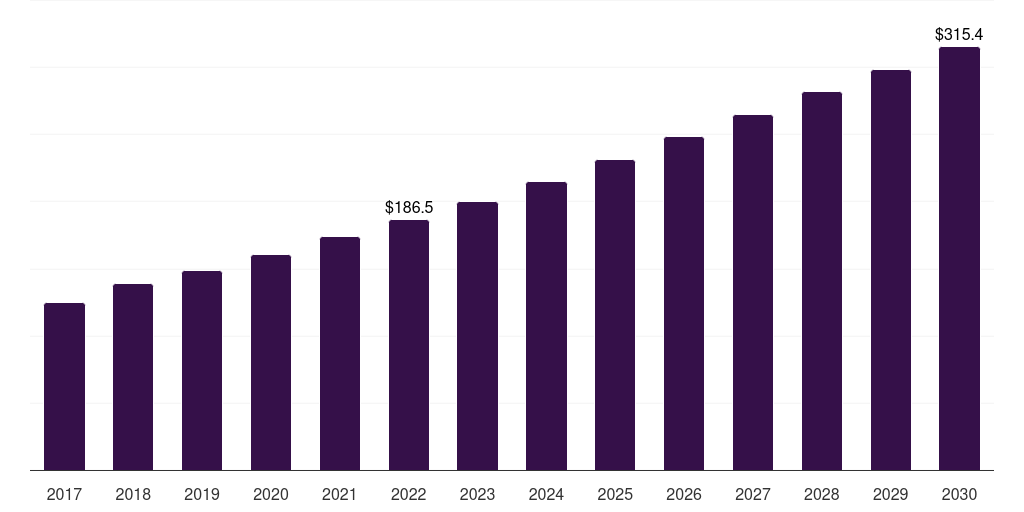Brazil Insect Repellent Market Size & Outlook, 2022-2030
Brazil insect repellent market, 2017-2030 (US$M)

Related Markets
Brazil insect repellent market highlights
- The Brazil insect repellent market generated a revenue of USD 186.5 million in 2022 and is expected to reach USD 315.4 million by 2030.
- The Brazil market is expected to grow at a CAGR of 6.8% from 2023 to 2030.
- In terms of segment, mosquito repellent was the largest revenue generating insect type in 2022.
- Mosquito Repellent is the most lucrative insect type segment registering the fastest growth during the forecast period.
Insect repellent market data book summary
| Market revenue in 2022 | USD 186.5 million |
| Market revenue in 2030 | USD 315.4 million |
| Growth rate | 6.8% (CAGR from 2022 to 2030) |
| Largest segment | Mosquito repellent |
| Fastest growing segment | Mosquito Repellent |
| Historical data | 2017 - 2021 |
| Base year | 2022 |
| Forecast period | 2023 - 2030 |
| Quantitative units | Revenue in USD million |
| Market segmentation | Mosquito Repellent, Bugs Repellent, Fly Repellent |
| Key market players worldwide | Reckitt Benckiser Group PLC, Godrej, Dabur India, Johnson & Johnson, Spectrum Brands Holdings Inc, Henkel AG & Co KGaA, Jyothy Laboratories, Coghlan’s, SC Johnson, Sawyer Products |
Other key industry trends
- In terms of revenue, Brazil accounted for 3.9% of the global insect repellent market in 2022.
- Country-wise, China is expected to lead the global market in terms of revenue in 2030.
- In Latin America, Brazil insect repellent market is projected to lead the regional market in terms of revenue in 2030.
- Brazil is the fastest growing regional market in Latin America and is projected to reach USD 315.4 million by 2030.
Mosquito repellent was the largest segment with a revenue share of 52.65% in 2022. Horizon Databook has segmented the Brazil insect repellent market based on mosquito repellent, bugs repellent, fly repellent covering the revenue growth of each sub-segment from 2017 to 2030.
Insects are a consistent problem in cities and the countryside across Brazil. The rise in the number of mosquitoes, bugs, and flies can be attributed to rapid urbanization in the country. According to URBANET, as of 2020, 89% of Brazil’s entire population lives in urban areas, while 6% live in favelas.
There were 37 medium-sized cities with this population size, 19 cities with a population of one to five million, and two urban settlements with 10 million or more inhabitants. The seven largest cities in Brazil will become even bigger by 2030.
Furthermore, Brazil's tropical climate and diverse ecosystems create favorable conditions for the spread of disease-carrying insects, such as mosquitoes. Vector-borne diseases like dengue, Zika, chikungunya, and malaria pose a significant health risk to the population. This increased threat has increased the demand for insect repellents that prevent vector-borne diseases.
No credit card required*
Horizon in a snapshot
- 30K+ Global Market Reports
- 120K+ Country Reports
- 1.2M+ Market Statistics
- 200K+ Company Profiles
- Industry insights and more
Insect Repellent Market Scope
Insect Repellent Market Companies
| Name | Profile | # Employees | HQ | Website |
|---|
Brazil insect repellent market size, by insect type, 2017-2030 (US$M)
Brazil Insect Repellent Market Outlook Share, 2022 & 2030 (US$M)
Related regional statistics
Sign up - it's easy, and free!
Sign up and get instant basic access to databook, upgrade
when ready, or enjoy our
free plan indefinitely.
Included in Horizon account
- 30K+ Global Market Reports
- 120K+ Country Reports
- 1.2M+ Market Statistics
- 200K+ Company Profiles
- Industry insights and more


